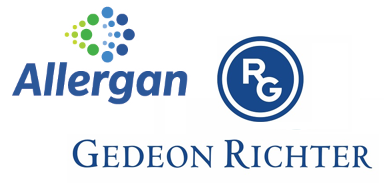
Allergan and Gedeon Richter are one step closer to getting an expanded FDA approval for cariprazine to treat bipolar disorder, having proved efficacy in a phase 3 study, Richter said Monday.
Cariprazine, approved and marketed as Vraylar to treat schizophrenia, met primary efficacy endpoints in a pivotal phase 3 study in 488 patients with bipolar I disorder, Richter said.
Data evaluated on the Montgomery-Asberg Depression Rating Scale (MADRS) showed significantly alleviated depressive episodes in the cariprazine arm than the placebo arm, Richter said. The study proved efficacy for both the 1.5 mg and 3 mg doses.
"We consider today's positive results a major milestone in making this promising treatment option available for patients suffering from bipolar depression and in widening the therapeutic scope of cariprazine," said István Greiner, Gedeon Richter’s research director.
However, data also showed 5 percent of patients in the cariprazine arm discontinued the study vs. 2.5 percent of those in the placebo arm, the company said.
The most common side effects of sedation, drowsiness, dizziness, akathisia, and nausea were reported twice as frequently by those taking cariprazine as a placebo, the company said.
The drug failed to prove efficacy last year. Despite setbacks, the company said it plans to push forward for the FDA approval with the phase 3 results.
"[The data] provides further support for cariprazine as a potential treatment for adults with bipolar depression. [We] look forward to submitting a supplemental New Drug Application (sNDA) for cariprazine as a treatment option for patients suffering from bipolar I depression," said Allergan’s chief R&D officer David Nicholson.

